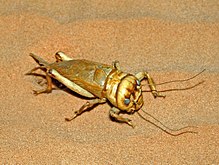
The orthopteran family Rhaphidophoridae of the suborder Ensifera has a worldwide distribution. Common names for these insects include cave crickets, camel crickets, Hogan bugs, spider crickets, land shrimp, and sand treaders. Those occurring in New Zealand are typically referred to as jumping or cave wētā. Most are found in forest environments or within caves, animal burrows, cellars, under stones, or in wood or similar environments. All species are flightless and nocturnal, usually with long antennae and legs. More than 500 species of Rhaphidophoridae are described.

Conocephalus is a genus of bush crickets, known as coneheads. It was described by Carl Peter Thunberg in 1815.

Enteroctopus is an octopus genus whose members are sometimes known as giant octopuses.
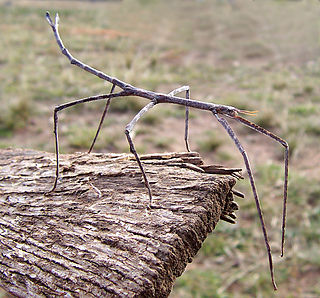
The Phasmatinae are a subfamily of stick insects in the family Phasmatidae. They contain at least three tribes; Bradley and Galil corrected the spelling to "Phasmatinae" and provides a key to tribes.

Gryllacrididae are a family of non-jumping insects in the suborder Ensifera occurring worldwide, known commonly as leaf-rolling crickets or raspy crickets. The family historically has been broadly defined to include what are presently several other families, such as Stenopelmatidae and Rhaphidophoridae, now considered separate. As presently defined, the family contains two subfamilies: Gryllacridinae and Hyperbaeninae. They are commonly wingless and nocturnal. In the daytime, most species rest in shelters made from folded leaves sewn with silk. Some species use silk to burrow in sand, earth or wood. Raspy crickets evolved the ability to produce silk independently from other insects, but their silk has many convergent features to silkworm silk, being made of long, repetitive proteins with an extended beta-sheet structure.
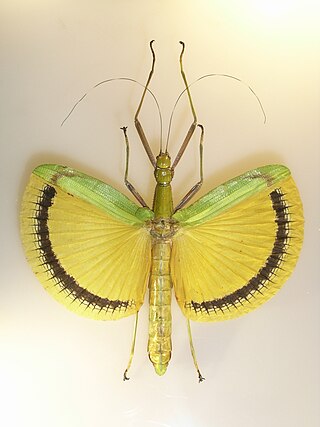
Necrosciinae is a subfamily of the stick insect family Lonchodidae, with its greatest diversity in South-East Asia.
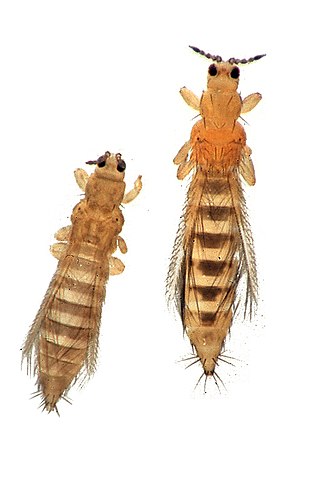
The Thripinae are a subfamily of thrips, insects of the order Thysanoptera. The Thripinae belong to the common thrips family Thripidae and include around 1,400 species in 150 genera. A 2012 molecular phylogeny found that the Thripinae was paraphyletic; further work will be needed to clarify the relationships within the group.

Gryllacridinae is an Orthopteran subfamily in the family Gryllacrididae.

Mecopodinae are a subfamily of bush crickets found in western South America, sub-Saharan Africa, and Asia. In Asia, the distribution includes India, Indochina, Japan, the Philippines, and Malesia to Papua New Guinea and Australasia, including many Pacific islands.

Brachytrupes membranaceus, the tobacco cricket, is a species of cricket in the family Gryllidae. It is a pest of crops including young tobacco plants. There are four subspecies, all of which are native to Africa.

Agraeciini is a large tribe of bush crickets or katydids in the conehead subfamily, Conocephalinae.

Therioplectes is a genus of horse fly in the family Tabanidae.

Pseudophyllus is a genus of bush-cricket, found in Indo-China and Malesia. It is the type genus of the tribe Pseudophyllini and the subfamily Pseudophyllinae.

Hyperbaeninae is a subfamily of Orthopterans, sometimes known as 'leaf-folding crickets' in the family Gryllacrididae; Hyperbaenus ensifer is the type species. The known distribution includes tropical: central and southern America, Africa and mainland Asia to Australasia.

Gryllini is a tribe of crickets and typical of the family Gryllidae. Species are terrestrial, carnivorous or omnivorous and can be found in all continenents except Antarctica.

Tarbinskiellus is a genus of crickets in the family Gryllidae and tribe Gryllini. Species can be found in Asia.

Tarbinskiellus portentosus is the type species of cricket in its Asian genus, which belongs to the tribe Gryllini. This species has been recorded from India, China, Indochina and Malesia; it is called Gangsir in Indonesia. Placed in the subtribe Brachytrupina, for many years this cricket was included in the African genus Brachytrupes, due to the relative size and shape its head.
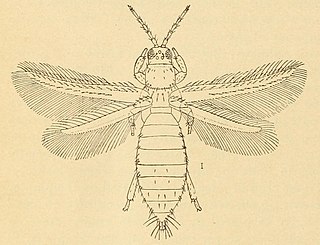
Frankliniella is a genus of thrips belonging to the family Thripidae.

Ascalaphus is a genus of owlfly belonging to the tribe Ascalaphini. The species of this genus are found in Africa and Asia.
